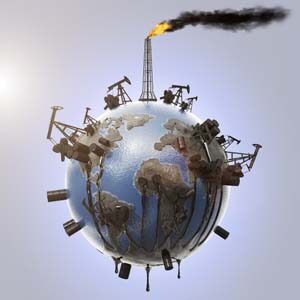Can We Internationalize the Earth’s Resources for All?

 Nature, instead of being seen as our home to be loved and cared for, has unfortunately become a source of capital gain and turned into a commodity for making money by ruling classes, industrialists and wealthy entrepreneurs. With its massive underground resources such as oil, gas, coal and minerals, nature paradoxically has become a source of fortune for the ruling elites of certain countries. Colossal and sudden capital gains arose out of sheer luck for such rulers and their countries, just by virtue of the value what lay within and beneath their (arbitrary) borders.
Nature, instead of being seen as our home to be loved and cared for, has unfortunately become a source of capital gain and turned into a commodity for making money by ruling classes, industrialists and wealthy entrepreneurs. With its massive underground resources such as oil, gas, coal and minerals, nature paradoxically has become a source of fortune for the ruling elites of certain countries. Colossal and sudden capital gains arose out of sheer luck for such rulers and their countries, just by virtue of the value what lay within and beneath their (arbitrary) borders.
For millions of years, the natural chemical processes taking place beneath the deserts, forests, oceans, and mountains have brought the material of nature to its present state with an irregular distribution of resources. Chemistry does not take national borders into account when forming oil, coal, metals and more critically water. Given the natural processes of geological evolution over millions of years, it absolutely does not make sense to say that these valuable resources completely belong to those people who accidently happen to be standing on them. And then the unexpected and unearned fortune for some countries means misfortune for the populations of countries that do not have these earth resources.
Using natural resources like coal, oil, gas, minerals and water for the purpose of making an opulent economy for a country and its elite families or private companies is obviously not income earned by labor, nor is it a measurement of real growth. These resources are capital, a kind of expropriated assets and profits that have not resulted from working or creating. Since the 1950s, a handful of nations and companies have pocketed massive incomes from oil, gas and coal. In contrast, many more countries strive hard to sustain their populace with orders of magnitude fewer resources to work with. They never have a chance of making the kind of money that a resource-rich country can make with much less effort. (This is very analogous to the phenomenon of unearned inheritances.) (see How About Limiting Personal Inheritance?)
Nature and Its Underground Resources Belong to Everybody
On the earth’s surface, fruits and vegetables can be consumed by humans and animals who inhabit their respective geographies and have been responsible for their cultivation. But the narrative of valuable underground resources is a different scenario. Denationalizing and freeing these resources should be done in favor of a global fair distribution of resources, especially knowing how most of the people in the globe live in poverty and often without drinking water. Therefore, this unjust practice of exclusive control and ‘ownership’ of the earth’s resources should stop, and the countries that “own” them should be relieved of ownership. Instead, the national control of such global resources should be reorganized in order to benefit all humanity through a process of first denationalizing, and then internationalizing, the earth’s resources.
The rules of the resource game need to change. In the Second Enlightenment, the new rules are interdependence, sharing, collectivity, collaboration, and global support, rather than thinking and acting selfishly and nationally.
To be sure, making a legal case for denationalizing and internationalizing these unearned resources, and a system for restructuring the income derived from the sale of these resources to be available for the globe rather than just one nation, will be very challenging. But it can be done. Laws can be made to return the ownership of these underground resources to humanity to replace the current laws which allow and protect the countries owning, exploiting and gaining capital from these natural resources.
Such laws simply protect the profit-oriented investments. These international business laws often ignore whether governments are even democratic and representing their own citizens. Some of these governments and business entities escape legal accountability to their own constituents and remain untransparent. The current laws are obviously about protecting capitalism, not egalitarian rights of the citizens. In a global and enlightened society that is trying to create a more just and equitable world, we simply cannot continue to apply the law of the jungle. Considering the dire conditions in which some poor countries struggle to survive, we require a fair and rational distribution of wealth and natural resources.
Addressing this huge issue in the Second Enlightenment could involve creating an international trust fund from the income of the extraction and sale of OIL, GAS and all underground resources. Thinking responsibly and maturely about our current circumstances, we must admit that this and future centuries will have to be about sharing and cooperation, not competition especially releasing WATER to regions and countries that there is water shortage. It will have to be about a creative and imaginative re-evaluation of things that have rarely been considered, such as internationalizing natural resources.
It is about giving underprivileged nations, communities, and individuals a chance to be part of a gracious and collaborative global village.
